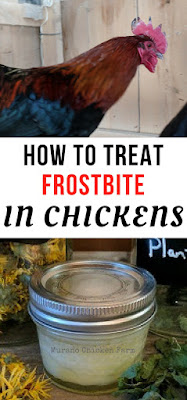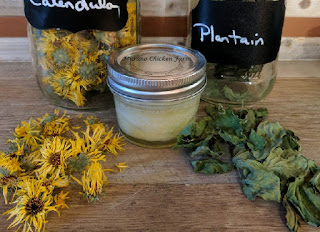Frostbite affects the combs and wattles of roosters more often than hens, simply because of their larger size.
Frostbite is very painful and may affect the birds behavior and appetite. If your chicken is acting lethargic, you'll want to add some electrolytes to his water to give him a little boost. Add a little pedialyte or gatorade, just make sure you water it down as they probably won't drink it full strength.
When you notice frostbite on one of your chickens, the first instinct is probably to bring him in and warm him up right away. That's a nice idea, however if he's going to go right back outside to the same freezing temperatures it will only make it worse. Thawing then refreezing can cause even more damage to the affected area.
Frostbite treatment for chickens
A chicken with severe frostbite will need warmed up immediately but gently, and housed in a warmer area for a few weeks while he starts healing. Do not use heaters, heat pads or hair dryers to warm up a chicken. Bring the affected chicken indoors. You may warm up the area with warm (not hot) water. Soak feet for up to 20 minutes, or apply to comb or wattles with a wet towel.A chicken with mild frostbite can be treated and allowed to rejoin the flock. Watch that the flock mates don't peck the affected area.
Many times frostbite is not discovered until the area has thawed on it's own and become swollen. If the area is warm to the touch, then obviously warming it is not necessary regardless of the temperature of the air. Just move on to treating the area.
I make this herbal burn salve to soothe frostbite, which works really well since frostbite is a type of thermal burn. If you have the ingredients, it doesn't take long to whip up. Apply the salve to the affected areas, making sure to cover them completely.
If you prefer something that you can grab at the local walmart though, Burt's Bees makes Dr Burt's Res-Q Ointment which is made with several skin healing herbs and oils. You could also use Neosporin antibiotic ointment (without the pain relief). Re-apply the treatment daily. If the feet are affected, wrap with gauze or vet wrap to keep clean and prevent infection.
If you plan on keeping the chicken in moderate temperatures while he heals, you can use a water based treatment like Vetericyn wound hydrogel. Do not use a water based treatment if the chicken will be outside though, as this added moisture along with the cold will make the frostbite worse!Do not pop blisters, peel or cut off blackened areas. They are protecting the healthy tissue beneath and could cause more damage by removing them. The dead tissue will fall off on it's own in time. Healing from frostbite can take 4-6 weeks. If flock mates are pecking at the frostbitten areas, you might need to keep the chicken separated. Watch for infection.
Once the dead tissue falls off it might look a little funny but it won't affect the chicken at all. The first winter that I had chickens, one of my roosters lost almost all the points of his comb to frostbite and he was perfectly fine after he healed up.
I have read that a rooster that loses part of his comb to frostbite can have lower fertility rate afterwards, but that has not been my experience with my breeding programs.
~L
Want information on raising chickens sent right to your email weekly? Click right here to join my list and get new posts sent directly to you the day they're published ... plus, you'll also get the free download '25 Ways to save money raising chickens'.
I am not a veterinarian or other animal care professional nor do I claim to be. I am simply passing on information that has worked for me and my flock. This information is for entertainment purposes only and is not meant to treat or diagnose any medical condition. Please see a vet if your chicken is ill. Click for my full disclaimer.
This post contains affiliate links. If you chose to purchase something through the link, I will get a small payment from Amazon. It will not affect your purchase price. Click for full disclosure.




No comments:
Post a Comment